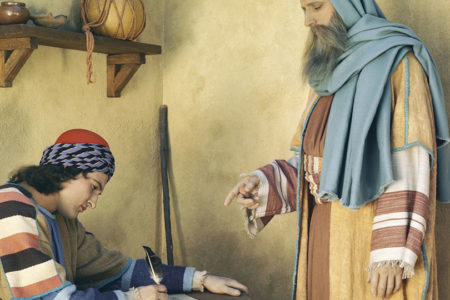Israel’s Restoration Jeremiah 33
In Jeremiah 33, the Lord gave Jeremiah a message that all of Judah’s efforts to fight against Babylon will fail miserably (33:1–5); but God will work to bring the nation back to its land, rebuild it, and forgive it (vv. 6–8). Jerusalem, the city of desolation, will be transformed into a place where the voice of joy is heard and the people will prosper (vv. 9–13).
However, the pinnacle of Jeremiah’s message in this chapter is the Messiah and the Davidic Covenant. Three specific elements appear in the flow of Jeremiah’s prophecy.
First, the Lord tells Israel and Judah, “In those days and at that time I will cause to grow up to David a Branch of righteousness; He shall execute judgment and righteousness in the earth” (v. 15). The “Branch” is the Messianic King, alluded to in Jeremiah 23:5, who will rule and prosper. This same term is also used of the Messiah in Isaiah 11:1 and Zechariah 3:8; 6:12. This Messiah is called “THE LORD OUR RIGHTEOUSNESS” (Jer. 33:16).
This personage is none other than the Lord Jesus Christ. However, the context does not point to the First Advent but, rather, the Second Advent. The prophecy highlights the fact that God’s ultimate plan for Israel’s restoration is something far greater than the nation’s return from exile in Babylon.
The second element of this prophecy is God’s promise, “David shall never lack a man to sit on the throne of the house of Israel” (v. 17). While somewhat comforting to the people of Israel, this statement causes a certain amount of theological consternation. Clearly, no Davidic king has ruled after Zedekiah was taken to Babylon. What does God’s statement mean?
The question is compounded by the promise that the Levitical priesthood also would be as permanent as the Davidic kingship (v. 18). Some commentators say such a statement forces Christ’s First Coming to be in view rather than His Second Coming1 because the book of Hebrews teaches Christ’s sacrifice has dealt with payment for sin once for all (Heb. 9).
However, even under Mosaic Law, Levitical and sacrificial functions were not solely salvific provisions. For example, some Levitical sacrifices in the Old Testament were thanksgiving offerings (Lev. 2), while others included memorials of special events (23:33–44). Such approaches in the future Kingdom would not be inconsistent with the sacrifice of Christ for sin.
As to David’s throne, the later context of the chapter points to the ongoing multiplication of Davidic sons (Jer. 33:21). No doubt those who heard Jeremiah remembered Moses had warned the Israelites of the curse of being cast out of the land due to sin (Dt. 28), followed later by restoration (chaps. 29—32). Nonetheless, the Davidic line would not be broken. There are probably descendants of David alive today. Furthermore, Jesus—a descendant of David—is alive and waiting to take His place on David’s throne.
Third, Jeremiah invoked the permanence of the Davidic Covenant to assure Israel that God will never cast His people away forever:
Thus says the Lᴏʀᴅ: “If you can break My covenant with the day and My covenant with the night, so that there will not be day and night in their season, then My covenant may also be broken with David My servant, so that he shall not have a son to reign on his throne” (Jer. 33:20–21).
God reasons from the impossible, telling people that, if they could stop the orderly succession of day and night, then it would be possible for the line of David to be broken. In this way, He acknowledges the ongoing, permanent nature of the Davidic Covenant, which He initiated in 2 Samuel 7.
Such a promise would give the Jewish people hope for the near future, when they returned from exile. However, it would also cause their minds to walk down the corridor of time to see the end-times glory of the Messiah reigning over Israel forever. Israel is a nation that God will never cast away for good; it will remain the apple of His eye.
ENDNOTE
- F. B. Huey, Jr., “Jeremiah,” “ Lamentations,” The New American Commentary (Nashville, TN: Broadman Press, 1993), 16:301–302.







